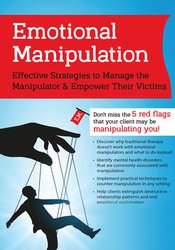

Hidden beneath masks of love, concern, dedication, and friendship, emotional manipulators use gaslighting, guilt, button-pushing, anger, and covert ploys to exploit their victim’s weaknesses and keep them doing whatever they want.
In therapy, manipulative clients leave you feeling ineffective and helpless as they suck you into the ups and downs of the dramas they’ve created. And you may already be working with clients suffering the devastating fallout of having an emotional manipulator in their lives. Their feelings of anxiety, depression, guilt, self-blame, and inadequacy may stem from emotional manipulation that’s difficult to detect.
Without proper training, you’ll fail to successfully work with emotionally manipulative clients or help clients facing emotional manipulation so they can effectively counter it and form healthy boundaries.
Watch Dr. Alan Godwin in this recording as he shares key insights to understand the motives behind manipulation commonly associated with disorders such as Borderline Personality Disorder and Narcissistic Personality Disorder, as well as manipulation by those who either do not have a personality disorder or have not yet been diagnosed as such. Effective strategies will empower you and your clients to recognize and counter manipulation in any setting.
Dr. Godwin’s expert guidance will leave you better able to work with emotional manipulators, those affected by manipulation in your practice, and allow you to establish healthy relational boundaries.
Purchase today and get the comprehensive solutions you need to transform the lives of emotional manipulators and their victims!
PESI Australia, in collaboration with PESI in the USA, offers quality online continuing professional development events from the leaders in the field at a standard recognized by professional associations including psychology, social work, occupational therapy, alcohol and drug professionals, counselling and psychotherapy. On completion of the training, a Professional Development Certificate is issued after the individual has answered and submitted a quiz and course evaluation. This program is worth 6 hours CPD for points calculation by your association.
| File type | File name | Number of pages | |
|---|---|---|---|
| Manual - Emotional Manipulation (1.13 MB) | 110 Pages | Available after Purchase |

Alan Godwin, Psy.D., is a licensed psychologist in private practice with over 30 years of experience. Dr. Godwin has expertise in working with personality disordered clients and with clients who’ve been negatively impacted in close relationships with disordered people. Certified in Alternative Dispute Resolution, he has dedicated himself to helping individuals, couples, churches, and businesses develop better ways of handling conflict. In addition to his private practice, Dr. Godwin serves on the adjunct faculty of the Graduate Counseling Department of Trevecca University in Nashville, TN, where he teaches doctoral students and has also taught undergraduate students.
Additionally, he has penned a regular quarterly feature entitled “Ask Dr. Alan” for Deacon magazine, writes a weekly email called “The Drama Review: In Relationships and Culture,” and has been a guest on numerous radio and television programs across the U.S. and Canada. Dr. Godwin’s book, How to Solve Your People Problems: Dealing with Your Difficult Relationships, explains how and why conflict goes badly and how to make it go well with two types of people: those who are normally-wired and those who are personality disordered. For more information about Dr. Godwin and his publications, visit www.peopleproblems.org.
Speaker Disclosures:
Financial: Dr. Alan Godwin maintains a private practice and serves as adjunct faculty at Trevecca University. He receives a speaking honorarium and recording royalties from PESI, Inc. He has no relevant financial relationships with ineligible organizations.
Non-financial: Dr. Alan Godwin has no relevant non-financial relationships.
Please wait ...